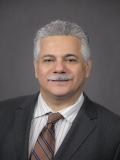Aziz Shaibani, Neuromuscular specialist

Dr. Shaibani is a graduate of the university of Mosul in Iraq in 1983. He completed neurology residency and neuromuscular fellowship at Baylor college of Medicine in Houston, Texas in 1995. Dr. Shaibani is board certified in 5 areas: neurology, neuromuscular medicine, neurophysiology, Electrodiagnostic medicine, and neuromuscular pathology. He is the director of the Nerve and Muscle Center of Texas; a comprehensive regional neuromuscular center. He is a clinical professor of medicine at Baylor College of medicine and an adjunct professor of neurology at KUMC.
He has been the principle investigator of 85 clinical trials (totaling up to $17 million), mostly focused on diabetic neuropathy, ALS, and myopathies. Dr. Shaibani published and co-published many articles and abstracts in peer reviewed journals including “NEJM” and “Muscle and Nerve”. He is the author two editions of an award-wining book entitled “video atlas of neuromuscular diseases.
Dr. Shaibani is a fellow of the American academy of neurology, American neurological association, American college of physicians, and American association of the neuromuscular and electrodiagnostic medicine. He is also the president elect of Texas neurological society, the largest neurological society in the nation, advocating for Texas 1400 neurologists. Dr. Shaibani trained many residents and students from Baylor College of Medicine and University of Texas.. The academic interest of Dr. Shaibani is; the impact of placebo on the outcome of neuromuscular clinical trials.
Financial relationships
There are no financial relationships to disclose.
**Disclaimer**
This Continuing Medical Education (CME) Learning Management System, Ethos, includes individuals designated as 'faculty' for CME purposes. Please note that the term 'faculty' refers solely to their role as a contributor/planner within a CME activity and does not imply any formal affiliation with UT Southwestern Medical Center (UTSW). The display of names and credentials is intended for educational purposes only and does not necessarily indicate a professional or academic relationship with UTSW. Participants are encouraged to verify the affiliations and credentials of faculty members independently if further clarification is needed.

 Facebook
Facebook X
X LinkedIn
LinkedIn Forward
Forward